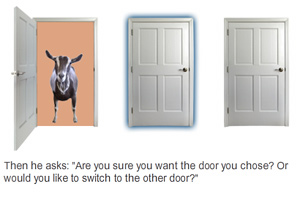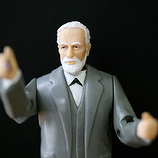The next time you apply for a credit card, your credit report and income will be only a part of the criteria used to determine your creditworthiness. For that matter, as long as you have the card, what you use it for will be noted and added to a growing set of data that makes up your psychological profile, which will then be referred to every time the bank deals with your or reevaluates your risk as a customer.
psychology

Preemptively Praise Customer Service Reps And They Will Do Your Bidding
Before asking customer service representatives to tackle thorny issues, win them over by first offering to praise them at the end of the call. According to Psychology Today, the offer establishes a reciprocal relationship that CSRs will try to honor, even if solving your problem takes, ugh, work.

3 Ways To Spend Less While Shopping
Shopping is a war and you are outgunned. Stores attack your desire for self-restraint with armies of psychologists, marketers, and “brand gurus.” Defend yourself from overspending with three easy and effective tips from Alpha Consumer…

Why You Fall For Dumb Things
The New York Times has an interesting series of tests and explanations that show why and how the human brain makes errors in estimating probability—and consequently, why we get suckered even if we think we’re overall pretty smart.

Super Bowl Ads Are Designed To Fuel Mindless Buying
Companies are paying $90,000 per second tonight to get their products before our recession-fearing eyes, and they plan to get their money’s worth. Tonight’s advertisers will use an array of tactics designed with one purpose: motivating us to buy their products.

Expensive Flowers Are Better Than No Flowers On Valentine's Day
According to enterprising scientists, people buy last minute Valentine’s Day gifts to avoid a fight, rather than to express love—as any lazy lover can attest. The marketing researchers devised three experiments to prove that our susceptibility to negative advertising is directly impacted by how long we wait to whip out the wallet.

Retailers Exploit Natural Human Stupidity To Get You To Buy More
The Chicago Tribune recaps the findings of some recent consumer behavior studies—for instance, we’re irrational buyers, prone to shoddy math and emotional decision making. The studies might be paid for by advertisers so they can better manipulate us, but as the Tribune notes, they’re useful for us too because they “can help shoppers make better spending decisions if they understand themselves better.”

Thinking About Financial Portfolios Makes Shoppers Spend More
Consumers can be cued to spend more through a series of simple “priming” questions. A study in the Journal of Consumer Research split subjects into two groups. One was asked a series of questions about the contents of their wallets: Did they have any library cards? Did they carry pictures or cash? How many other wallets did they own? The other was asked about their financial portfolio.
Neuromarketing Promises Greater Manipula- er, "Effectiveness"
Neuromarketing is a new audience measurement approach that uses functional magnetic resonance imaging (fMRI), along with other fancy brain reading machines formerly reserved for the medical industry, to observe and measure brain activity in people exposed to advertisements. The resulting data can be used to craft more effective ads and target them more accurately to the right consumer. Says the director of a neuromarketing consultancy, “Emotions cannot necessarily be accurately described. We can see the discrepancy between what you say and what your brain says, and reduce the margin of error.”

Are Americans Addicted To Coupons?
Alright consumers, Macy’s heard you loud and clear: you want a good deal, not a good price. To celebrate the revelation, Macy’s is proud to announce the return of the coupon. Psychological gratification is yours to clip and snip away, 15%-20% at a shot.
Despite their dowdy image, coupons remain a huge business. In 2006, companies issued 279 billion of them, or roughly 1,000 per person, up 13 percent in four years, according to NCH Marketing Services in Deerfield, Ill.

How Big Is That Discount? The Last Digit Determines Consumers' Perception Of The Deal
According to a study published in the Journal of Consumer Research the last digit of a product’s price determines your perception of how much the item has been discounted.

../../../..//2007/07/14/companies-convince-you-to-unwittingly/
Companies convince you to unwittingly use more shampoo, detergent, and mouthwash by increasing the size of the container cap. “A “use” was “one capful,” so when the cap got just a bit bigger, consumers used just a bit more. And as a result, the product was used up faster, resulting in a quicker need to buy more.”

Chocolate Makes You More Depressed
From the ‘Morning Bummer’ department, I have an unfortunate cousin who is trapped in that infinitely recursive cycle of eating that happens when you eat because you are depressed and you are depressed because you’re fat. Weighing upwards of four bills, the woman will often come home from work, climb into bed and eat two full bags of Doublestuffed Oreos while watching television in a gloomy bedroom. She’s this really great, vivacious, knee-slapping personality, making it all even sadder that she could easily be featured as the mascot of Fat Chicks in Party Hats.

Invasion of the iPod Snatchers
A 55 year old Iranian schizophrenic has decided that all of her material possessions have insidiously been replaced by doppelgangers. Despite the fact that these objects all are identical to the smallest feature or blemish of her existing possessions, she is convinced that they are lacking the particular quality of belonging to her. She appears to be suffering from a variation of Capgras Syndrome, a neurological disorder that causes people to believe that their friends and family members have been replaced by impersonators.

Most Ebay Bidders Prefer Paying More for Free Shipping
A new study shows that most Ebay shoppers would rather pay less and pay for shipping than pay more and have free shipping.
Mind Hacks Asks “Is There A Science To Advertising?”
One of my favorite neuroscience blogs, Mind Hacks, is posing an open question on the nature of advertising to their readers. They are looking to fill next month with posts examining whether or not advertising is a science and the psychological implications and effects it has on the clump of electrically-charged gray noodles coagulating in our heads.


